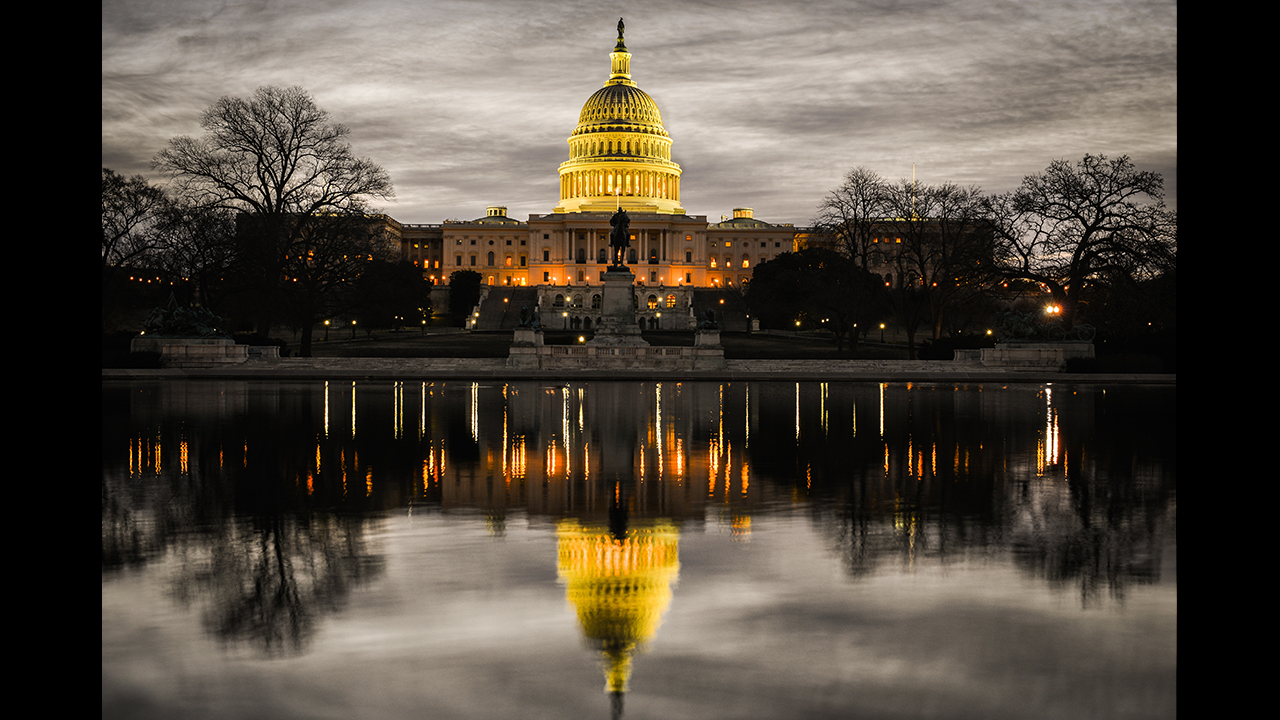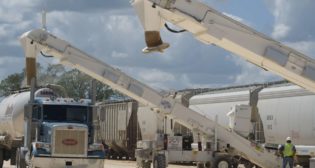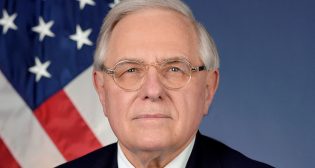![“This record growth [in fiscal year 2024’s third quarter] is a direct result of our innovative logistic solutions during supply chain disruptions as shippers focus on diversifying their trade lanes,” Port NOLA President and CEO and New Orleans Public Belt (NOPB) CEO Brandy D. Christian said during a May 2 announcement (Port NOLA Photograph)](https://www.railwayage.com/wp-content/uploads/2024/05/portnola-315x168.png)
Swirling Policy Currents
Written by Don Itzkoff, Contributing Editor
Shutterstock/ Orhan Cam
RAILWAY AGE, FEBRUARY 2024 ISSUE: Looming questions for this year: Will Congress act on rail safety? Will STB oversight direction continue? Will substantial public investment in freight rail projects last?
Freight railroads face swirling policy currents, too many to catalogue without even considering the upcoming 2024 elections. Will a 10-year “pilot” of 91,000-pound trucks operating on the nation’s highways, approved last year by a key Congressional committee, become law? How will courts treat a state mandate that railroads move completely to low or zero-emission locomotives? These and myriad other policy uncertainties loom this year and beyond.
Yet among the policy threats and opportunities confronting freight railroads, three 2024 challenges stand out. One year after a Norfolk Southern train derailed in East Palestine, Ohio on Feb. 3, 2023, spawning a toxic plume and a political storm, will Congress mandate more rail safety oversight? What does Surface Transportation Board (STB) Chairman Martin J. Oberman’s November 2023 announcement that he plans to leave the STB in 2024 mean for railroads and their customers? And will the hugely successful Consolidated Rail Infrastructure and Safey Improvements (CRISI) grant program administered by the Federal Railroad Administration (FRA) receive the same or higher funding levels when the current surface transportation authorization expires in FY 2026?
Will Congress Act on Rail Safety?
The February 2023 derailment of a 149-railcar Norfolk Southern train lit unprecedented national attention to a transportation incident in which fortunately no one died. Dozens of NS cars including 11 hazardous materials cars derailed, five of which contained more than 115,000 gallons of vinyl chloride. Images of the derailment site and the subsequent controlled vent and burn of toxic chemicals, plus the vivid fears and concerns of East Palestine residents, fanned political fires. Environmental Protection Agency Administrator Michael Regan first visited East Palestine 13 days after the incident. The following week, former President and 2024 candidate Donald Trump arrived to blast the federal response to the derailment as a “betrayal.” One day later, Secretary of Transportation Pete Buttigieg inspected the East Palestine site and reviewed the disaster response.
East Palestine upended past Congressional debate on rail safety. Two United States senators wrote to Secretary Buttigieg, emphasizing their “concerns with PSR” (Precision Scheduled Railroading). In assessing potential contributors to the East Palestine incident, these senators asserted that “it is not unreasonable to ask whether a crew of two rail workers, plus one trainee, is able to effectively monitor 150 cars”—a not-unexpected query from elected representatives, except that Republican colleagues of the letter authors, Senators J.D. Vance (R-Ohio) and Marco Rubio (R-Fla.), have more commonly voiced apprehension about the scope and cost of government regulation.
Congress held multiple hearings addressing the East Palestine incident and disaster response. Last May, the Senate Commerce Committee approved the Railway Safety Act (S.576) by a vote of 16-11 (including two Republicans in favor). The legislation prescribes a long list of safety mandates, including new requirements on crew size, train brakes, railcar inspection, risk-based defect detection systems, a high-hazard train framework, increased fines and penalties, and more. S.576 gained 58 supporters, two short of the 60 votes typically needed to advance legislation in the Senate.
In the House, Members introduced H.R.1674 as a companion measure to S.576 and other rail safety bills. Transportation and Infrastructure Committee (T&I) Chair Rep. Sam Graves (R-Mo.) and the T&I Rail Subommittee Chair Rep. Troy Nehls (R-Tex.) said, however, that they wanted the National Transportation Safety Board (NTSB) investigation into East Palestine finished before considering legislative action.
Offering another perspective 300 days after the derailment in December 2023, Greg Regan, President of the AFL-CIO Transportation Trades Department, wrote House Speaker Mike Johnson (R-La.) and T&I Chair Graves to declare, “It is outrageous that the House of Representatives has not taken a single step to address rail safety since the East Palestine derailment.” Speaking before the U.S. Conference of Mayors on Jan. 19, 2024, Transportation Secretary Buttigieg called for Congressional passage of S.576 and said, “Let’s not allow America to get to that one-year mark and not have that safety act become law.”
The NTSB’s report on East Palestine, now expected mid-2024, will recharge Congressional debate on rail safety. The current polarized dynamic in Washington makes it reasonable to question whether in an election year Congress can agree on more rail safety oversight. The post-2008 Chatsworth and 2013 Lac-Mégantic experiences instruct, however, that another major rail incident in 2024 could well trigger Congressional passage of new rail safety laws.
Will STB Oversight Direction Continue?
On Nov. 16, 2023, STB Chair Martin J. Oberman announced that he will not seek re-appointment to a second term and would leave the agency in 2024. Railway Age Contributing Editor Frank Wilner has explained many of the surrounding issues: Upon the chair’s departure the vice chair becomes the acting chair; factors President Biden may assess in nominating a permanent STB chair; whether Republican Member Patrick J. Fuchs will be renominated for a second term; the fluidity in an election year of Senate consideration of any STB nominee(s); and that of course, a change of party control of the Presidency enables nomination of a new Republican chair.
More than any leader since the STB’s formation in 1995, Oberman has emphasized that, in his words, railroads are “not just any industry, but an industry which has been imbued with a public interest mandate—the common carrier obligation—since it came into existence two hundred years ago …” In the same speech in which he announced his intention not to seek re-nomination to a second term, Oberman cited the Supreme Court’s explanation in 1897 of the common carrier doctrine:
“It must also be remembered that railways are public corporations organized for public purposes, granted valuable franchises and privileges … and that they all primarily owe duties to the public of a higher nature even than that of earning large dividends for their shareholders.” – United States v. Trans-Missouri Freight Ass’n, 166 U.S. 290, 332–33, 17 S. Ct. 540, 555–56, 41 L. Ed. 1007 (1897).
Under Oberman’s chairmanship the STB investigated “urgent issues” in freight service including the impact of unprecedented rail service embargoes. This oversight resulted in STB mandates for railroad reports on labor and equipment shortages, filing of service recovery plans and other requirements.
The STB has addressed specific shipper complaints of inadequate service, notably in Navajo Transitional Energy Company, LLC—Ex Parte Petition for Emergency Service Order, Docket No. NOR 42178. By a 3-2 vote on June 23, 2023, the STB issued a preliminary injunction requiring BNSF to transport a certain level of NTEC coal traffic. In a statement accompanying the STB’s decision, Chairman Oberman said, “The common carrier obligation is a core tenet of the Board’s regulation of the freight railroad industry and is a pillar of the railroads’ responsibility to our country’s economy … Today’s decision reflects the majority’s finding that the common carrier obligation requires a railroad to provide service on a customer’s request that is within the railroad’s capacity to provide.” STB Members Fuchs and Michelle A. Schultz dissented in separate expressions.
On Dec. 13, 2023, with the parties having reached a settlement in the NTEC matter, the STB dismissed the proceeding and lifted, but did not vacate, the previously ordered injunction. Members Fuchs and Schultz dissented from the portion of the dismissal decision not vacating the injunction. Fuchs noted the precedent of this case and the “implications of the Board’s finding related to the common carrier obligation, and … that the Board ought to value flexibility, resiliency and service-related outcomes and effects so that it avoids harming broad groups of shippers, penalizing crucial rail capacity, and imposing unnecessary costs on the network.”
Schultz also disagreed with the portion of the majority decision that denied NTEC’s unopposed motion to vacate the STB’s June 23, 2023 injunction, which in her view did not provide “useful guidance in defining or assessing a carrier’s common carrier obligation under 49 U.S.C. § 11101; nor did it adequately explain how BNSF violated its common carrier obligation.”
In another shipper complaint case, Sanimax v. Union Pacific Railroad, in which Sanimax seeks damages for alleged UP service reductions and disruptions, on Dec. 15, 2023 the STB granted a request to extend the procedural schedule to enable the parties “to conduct negotiations that could potentially resolve the dispute.”
With Docket No. EP 711 (Sub-No.2) issued Sept. 7, 2023, the STB continued to scrutinize rail service. In EP 711, Oberman secured the unanimous endorsement of all four of his STB member colleagues to propose “a new set of regulations that would provide for the prescription of reciprocal switching agreements to address inadequate rail service, as determined using objective standards based on a carriers’s original estimated time of arrival, transit time, and first-mile and last-mile service.” Comments have closed, with large railroads stating that EP 711 goes too far with unwieldy processes, and shippers complaining that the proposed rules don’t go far enough.
Chairman Oberman’s pledge to serve “several months” into 2024 because “I still have much work to do and many initiatives to complete” suggests his desire to see EP 711 adopted. The question for railroads, given the easing of supply chain pressures and the renewed commitment of Class I carriers to enhance the experience of their customers, may be this: Does impending new leadership of the STB mean, to paraphrase Winston Churchill, the end of the beginning, or the beginning of the end, of elevated regulatory attention to freight rail service?
Will Substantial Public Investment in Freight Rail Projects Last?
In the Fall of 2023 FRA awarded $720 million for short line rail investments (out of $1.4 billion in FY 2022 CRISI funding available) to 47 projects in 36 states. For 2024, FRA has said it will combine FY 2023 and FY 2024 CRISI appropriations into a single notice of funding opportunity (NOFO), with at least $2.3 billion expected to be available.
Marc Williams, Executive Director of the Texas Department of Transportation and Chair of the American Association of State Highway and Transportation Officials’ Council on Rail Transportation, told Railway Age: “State DOTs are doing their part to make sure the historic investment for rail included in the Infrastructure Investment and Jobs Act (IIJA) is being spent to benefit people and communities across the country. Rail investment is a real catalyst for economic growth and opportunity as it serves to improve safety, facilitate freight flow and enhance personal mobility. State DOTs will continue to be effective stewards of these dollars, which will result in projects that improve quality of life for users in communities small and large for many years to come.”
This support of states and other stakeholders is vital, because the IIJA expires at the end of FY 2026. Following the FRA’s upcoming 2024 CRISI NOFO, only two more fiscal years of guaranteed appropriations for CRISI at $1 billion per year above the pre-IIJA baseline remain. Williams offers a positive vision for railroads to cement this CRISI investment cornerstone so valuable to short lines. But will previously awarded and pending CRISI funds be spent wisely enough, with sufficient recognition of all the public benefits, to sustain a bright future for CRISI?
What’s Next?

In his most recent policy infographic widely read in Washington, D.C., respected political strategist and advocate Bruce Mehlman advised to buckle up and “Expect Plot Twists & Curve Balls” in 2024. The accelerating array of policy challenges and opportunities for freight railroads, combined with the unknowns of a Presidential election year, spur anxiety.
One way to deal with such unpredictability, suggests Maggie Jackson, author of “Uncertain: The Wisdom and Wonder of Being Unsure,” is to “rethink our outdated notions of not knowing as weakness, and instead discover this mindset as a strength.” For the rail sector, accepting uncertainty with a renewed commitment to doing the right things well—including keeping trains on the rails and apart while exceeding customer expectations—will line tracks favorably for policy success.
Don Itzkoff is Chief Policy Officer for Patriot Rail Company.



